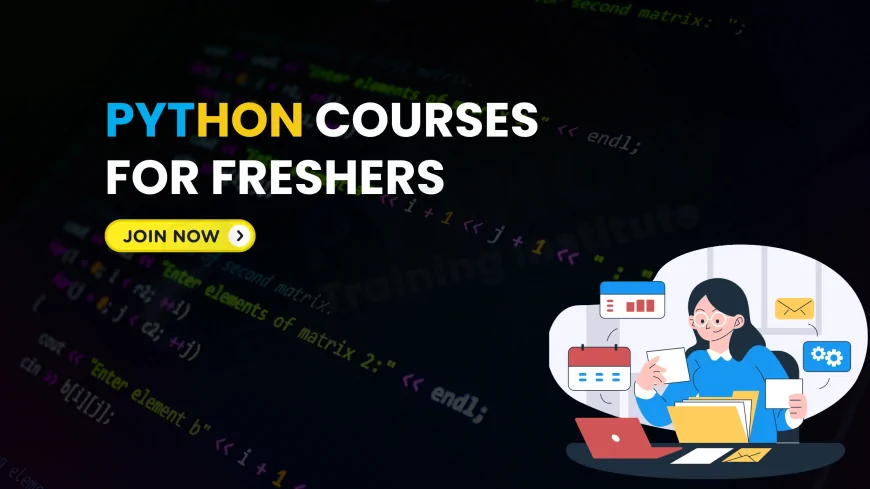Best Python Training Programs for Freshers in Pune | Learn & Get Placed
Explore the top Python training programs for freshers in Pune. Learn Python from expert instructors, build real-world projects, earn certifications, and boost your IT career with placement support.

Python is more than just a programming language — it's a gateway into one of the most dynamic and opportunity-rich career fields in the modern world. As a fresher stepping into the world of programming and software development, choosing to begin with Python is not just a smart choice, it’s a strategic one.
For freshers in Pune, one of India’s fastest-growing tech hubs, learning Python opens the door to employment in leading industries such as software services, data science, artificial intelligence, fintech, web development, and automation. But not all training programs are created equal.
In this detailed blog, we explore everything you need to know about Python training programs for freshers in Pune — from what to expect, key features, the curriculum, outcomes, benefits, and how to evaluate the right course without relying on brand names or institutes.
Why Freshers in Pune Should Learn Python
Pune is home to thousands of startups, software development firms, IT companies, and R&D centers. From Hinjawadi to Magarpatta, this city attracts a high density of tech-driven projects and investments. This ecosystem naturally demands a skilled and job-ready workforce, especially developers with Python proficiency.
Why Python is Ideal for Beginners
Python is beginner-friendly and intuitive. With its simple syntax, rich standard library, and broad applicability, it allows freshers to start building real applications in a short time. Compared to other languages like Java or C++, Python reduces the learning curve drastically, making it the most recommended first language.
Demand in the Job Market
According to multiple tech industry reports, Python consistently ranks among the top three programming languages globally, and Pune’s local hiring trends reflect the same. Python is extensively used in:
-
Web development
-
API development
-
Machine learning
-
Data analytics
-
Automation testing
-
Scripting
As a fresher in Pune, possessing Python skills can dramatically increase your chances of employability, even before graduation.
What to Expect from a Good Python Training Program
Before enrolling in any training, it's important to understand what makes a program truly valuable — especially for freshers who need foundational and hands-on knowledge.
1. Structured, Beginner-Friendly Curriculum
Python courses designed for freshers should start from absolute basics:
-
Installing Python and setting up the environment
-
Understanding syntax, variables, data types
-
Using conditional statements and loops
-
Working with functions and modules
The goal is to build confidence in writing clean, working code right from the first week.
2. Progressive Learning Model
A well-designed training program moves in stages:
-
Basic programming concepts
-
Data structures and logic building
-
Object-oriented programming (OOP)
-
File handling and exception management
-
Intro to real-world projects
Each level prepares you for the next, ensuring no gaps in understanding.
3. Hands-On Practice with Real-World Examples
Theory alone won’t prepare you for jobs. Good Python training emphasizes:
-
Mini projects in each module
-
Assignments using real datasets
-
Simple apps like to-do lists, calculators, or weather apps
-
Exposure to APIs, JSON, and file operations
These practical tasks bridge the gap between knowledge and experience.
Core Modules of a Python Training Program for Freshers
Here’s an overview of what a standard fresher-focused Python training program should include:
| Module | Key Learning Outcomes |
|---|---|
| Python Basics | Syntax, variables, keywords, data types, basic I/O |
| Control Flow Statements | if, else, elif, loops, nested loops |
| Functions & Modules | Defining functions, return, imports, module creation |
| Data Structures | Lists, tuples, sets, dictionaries, indexing and slicing |
| File Handling | Read/write files, working with text, CSV, and JSON |
| Exception Handling | Try-except blocks, error handling techniques |
| Object-Oriented Programming | Classes, objects, inheritance, encapsulation, polymorphism |
| Introduction to Libraries | math, random, datetime, os, sys |
| Mini Projects | Calculator, password generator, expense tracker |
Learning Modes for Python Training in Pune
Depending on your goals, learning style, and availability, you can choose from different formats:
1. Offline Classroom Training
-
Ideal for those who prefer face-to-face guidance
-
Offers peer learning and hands-on lab sessions
-
Typically scheduled in fixed batches (weekdays/weekends)
2. Online Live Training
-
Suited for remote learners or those with part-time jobs
-
Interactive with live Q&A, screen sharing, and assessments
-
Recordings available for revision
3. Pre-recorded Courses
-
Self-paced with lifetime access
-
Great for fast learners or those balancing college schedules
-
Requires discipline and consistency
Features to Look for in a Python Program (Beyond Curriculum)
A lot of freshers make the mistake of choosing a course solely based on price or duration. While those factors matter, what truly makes a training program effective are the following features:
| Feature | Why It Matters |
|---|---|
| Mentor Support | Clears doubts and builds confidence |
| Practice-Based Learning | Helps retain concepts better than passive listening |
| Project Portfolios | Important for job applications and interviews |
| Mock Interviews & Assessments | Prepares freshers for real hiring scenarios |
| Resume & GitHub Profile Guidance | Boosts your professional branding online |
| Certification | Adds credibility to your learning journey |
Choose a course that supports not just what you learn, but also how you apply and present it.
How to Evaluate a Python Course Without Relying on Brand Names
In Pune, many training centers and academies offer Python courses. But not naming them here is intentional. Instead, you should evaluate the course on these objective criteria:
-
Instructor Quality
-
Check if instructors are working professionals with real coding experience.
-
Avoid purely academic trainers with no practical exposure.
-
-
Student Reviews
-
Look for detailed reviews and testimonials that describe outcomes, not just star ratings.
-
-
Portfolio Opportunities
-
Ensure the course allows you to build 3–5 small projects and at least 1 major project.
-
-
Community and Peer Support
-
Courses with active discussion groups, coding forums, and Slack/Discord support channels are more engaging.
-
-
Post-Course Resources
-
Look for access to interview prep materials, career advice, and alumni groups.
-
Avoid selecting a course just because of flashy branding or heavy advertising. Let content quality, practice focus, and trainer interaction be your guide.
What Freshers Should Build During Python Training
By the end of a 6–12 week Python program, a fresher should ideally be able to develop:
| Project Type | Description |
|---|---|
| Console Applications | Calculator, quiz game, file manager |
| Desktop GUI Tools | To-do list, login form, basic invoice manager (using Tkinter) |
| Web Scrapers | Scrape prices, news headlines, job listings (using BeautifulSoup) |
| Data Handlers | Import/export CSV and JSON files, analyze and clean data |
| API Projects | Weather app, movie database search, translation tool |
| Automation Scripts | Rename files, auto-folder sorters, file converters |
These projects not only reinforce learning but can also be showcased in interviews or on GitHub.
Python Job Roles Suitable for Freshers
With Python as your foundation, you can apply for various entry-level roles in Pune’s IT sector:
-
Python Developer (Trainee)
-
Backend Developer (Python/Django/Flask)
-
Automation Tester (Python + Selenium)
-
Junior Data Analyst
-
API Integration Intern
-
Scripting Assistant or DevOps Intern
Even if the job description doesn’t say “Python,” having that skill often makes a difference — especially in automation, testing, and support roles.
Learning Beyond the Classroom
After completing a Python training program, your learning journey should continue. Here's how freshers can keep growing:
1. Join Open-Source Projects
Contribute to repositories on GitHub to get real-world experience.
2. Freelancing
Start with small tasks on platforms like Fiverr or Upwork to build client-facing experience.
3. Participate in Hackathons
Events like Smart India Hackathon or college-level coding challenges boost your visibility and confidence.
4. Practice Coding Daily
Platforms like Codeforces, HackerRank, and LeetCode help sharpen your problem-solving skills.
5. Learn a Python Framework
Once confident in core Python, move to:
-
Django (Web Development)
-
Flask (Microservices)
-
Pandas/Numpy (Data Handling)
-
Selenium (Automation Testing)
Python Certification: Is It Necessary?
Many Python training programs include certificates, but what truly matters is your ability to code, solve problems, and build projects. However, certifications can:
-
Add value to your resume
-
Serve as proof of course completion
-
Help during campus placements and interviews
Choose a course that offers a well-recognized certification, but never rely solely on it — practical skills will always outweigh paper qualifications.
Estimated Timeline for Python Mastery (For Freshers)
| Phase | Duration | Focus Area |
|---|---|---|
| Week 1–2 | Basics | Syntax, variables, data types, control flow |
| Week 3–4 | Data Structures | Lists, dictionaries, tuples, sets |
| Week 5–6 | Functions & OOP | Reusability, modularity, classes |
| Week 7–8 | File Handling & Errors | File operations, exception handling |
| Week 9–10 | Projects | Build and complete real applications |
| Week 11–12 | Revision + Mock Interviews | Final polishing before job hunting |
Depending on your pace, this roadmap may vary, but consistency and practice are the biggest factors in success.
FAQ's
1. What is the best Python training program for freshers in Pune?
The best Python training programs in Pune for freshers offer beginner-friendly modules, hands-on coding sessions, and real-world project experience. Look for institutes with experienced trainers, placement assistance, and comprehensive curriculum covering core and advanced Python topics.
2. How long does a Python training course take for freshers in Pune?
Most Python training programs for freshers in Pune last between 6 to 12 weeks, depending on the course intensity. Some institutes offer flexible weekday or weekend batches to accommodate college students or working individuals.
3. Is Python training in Pune suitable for complete beginners?
Yes, Python training programs in Pune are ideal for freshers and complete beginners. The courses start with basics like syntax and data types before progressing to functions, OOP, and projects, ensuring a strong foundation.
4. What career opportunities are available after Python training in Pune?
After completing Python training in Pune, freshers can pursue roles like Python Developer, Web Developer, Data Analyst, QA Tester, or Automation Engineer. With the right skills, Python opens doors to diverse IT careers.
5. Do Python training institutes in Pune offer placement assistance?
Many reputed Python training institutes in Pune provide placement assistance through resume building, interview prep, and job referrals. Freshers can expect help finding internships and entry-level roles in tech companies.
6. What topics are covered in a Python training course for freshers in Pune?
A Python training course in Pune typically covers variables, data structures, control flow, functions, modules, OOP, file handling, error handling, and basics of frameworks like Flask or Django, plus mini-projects.
7. How much does Python training cost in Pune for freshers?
Python training programs in Pune usually range from ₹5,000 to ₹25,000, depending on course duration, mode (online/offline), and inclusion of live projects or certifications. Some institutes also offer EMI options.
8. Can freshers learn Python online from Pune-based institutes?
Yes, many Python training institutes in Pune offer live online classes with interactive sessions, doubt clearing, and recorded lectures. Online courses provide flexibility for freshers who prefer remote learning.
9. What are the prerequisites for joining a Python course in Pune?
There are no strict prerequisites for freshers. A basic understanding of computers and logical thinking is sufficient. Some institutes may suggest learning fundamentals of programming, but it’s not mandatory.
10. Are certifications provided after completing Python training in Pune?
Yes, most Python training institutes in Pune offer completion certificates, and some also guide students in earning global certifications like PCEP or PCAP, boosting credibility for job seekers.
11. How important are projects in Python training programs for freshers?
Projects are a crucial part of Python training for freshers. They help apply theoretical knowledge to real-world problems, enhance problem-solving skills, and strengthen your portfolio for job applications.
12. Can Python training in Pune help freshers get freelance jobs?
Absolutely! With skills learned from Python training programs, freshers can take up freelance projects in web development, automation, or data analysis through platforms like Upwork, Fiverr, or Freelancer.
13. Which Python libraries are taught in Pune training programs?
Python training programs in Pune typically introduce libraries like NumPy, Pandas, Matplotlib, Tkinter, and Requests. Advanced courses may cover Flask, Django, Selenium, or machine learning libraries like Scikit-learn.
14. Is Python a good first programming language for freshers?
Yes, Python is widely considered the best first language due to its simple syntax, readability, and vast applications. Freshers in Pune find it easy to learn and apply, even without a coding background.
15. Do Python courses in Pune include data science or web development modules?
Some advanced or specialized Python courses in Pune offer optional modules in Data Science (using Pandas, NumPy, etc.) or Web Development (using Flask or Django), helping freshers explore career-specific paths.
16. How can Python training in Pune boost a fresher’s resume?
Python training adds a valuable skill to a fresher’s resume, demonstrating hands-on programming knowledge. Projects and certifications from recognized institutes make candidates more appealing to tech recruiters.
17. What is the average salary after Python training for freshers in Pune?
Freshers completing Python training in Pune can expect starting salaries ranging from ₹2.5 LPA to ₹4.5 LPA, depending on their project experience, internship exposure, and overall technical skills.
18. Are weekend Python training batches available for college students in Pune?
Yes, most institutes in Pune offer weekend and evening batches specifically designed for college students or working professionals, making it easier to learn Python alongside academics or jobs.
19. Do Pune-based Python training institutes offer doubt-clearing support?
Reputed Python training institutes in Pune offer regular doubt-clearing sessions, live Q&A, and 1-on-1 mentorship to help freshers grasp complex concepts and reinforce learning throughout the course.
20. How do I choose the best Python training institute in Pune?
Choose a Python training institute based on trainer experience, curriculum depth, student reviews, placement support, and practical learning opportunities. Attending demo classes can help in making the right decision.
Final Thoughts
For freshers in Pune, Python is more than just a useful programming language — it's the key to entering the tech industry with confidence. The city’s expanding IT ecosystem offers countless opportunities for those who are job-ready, and Python gives you a competitive edge in nearly every sector.
A good training program should not just teach syntax, but should equip you with practical skills, confidence in building projects, and preparation for interviews.
If you’re a fresher looking to start a solid tech career in Pune, investing your time in the right Python training program can be one of the smartest decisions you’ll make. The effort you put in now will pay off in the form of better job prospects, career clarity, and long-term growth.
What's Your Reaction?
 Like
0
Like
0
 Dislike
0
Dislike
0
 Love
0
Love
0
 Funny
0
Funny
0
 Angry
0
Angry
0
 Sad
0
Sad
0
 Wow
0
Wow
0













